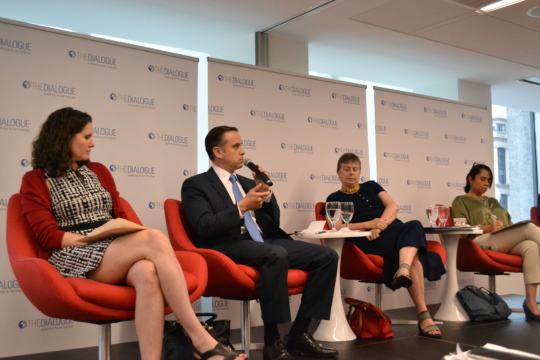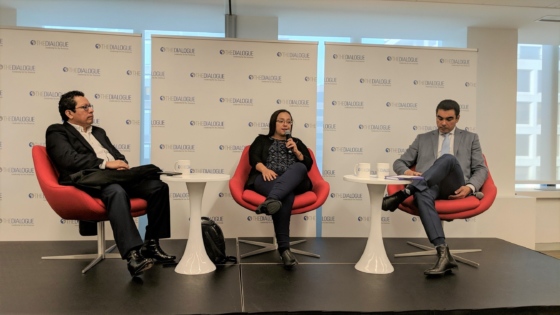Q: Press freedom has been in the headlines recently, as a Bolivian radio journalist was set on fire in a brutal attack last month, and Mexico's government in July said that 67 journalists have been killed and 14 disappeared in the country since 2006. Meanwhile, critics have charged that the press is under siege in Argentina, where the government passed a controversial law that will break up Grupo Clarín, a leading media conglomerate it considers an opponent. Is press freedom seriously jeopardized in these countries or elsewhere in the region? What implications does it have for the state of democracy? Should regional bodies or other organizations be taking action? If so, how?
A: Viviana Giacaman, director for Latin America programs at Freedom House: "When the leader of a nation refers to the media as 'liars, criminals and enemies of the nation,' as Ecuadorean President Rafael Correa regularly does, it is a clear signal that freedom of expression is under threat. In Ecuador, Argentina, Bolivia and Venezuela, inflammatory government rhetoric has become a major threat to the press. These attacks intimidate journalists and create self-censorship, thereby depriving the public of critical, independent sources of information. Although dissenting press still operates freely in these and most countries in the region, its size and influence has shrunk dramatically. Governments have taken control of media by creating big state media holdings or withdrawing advertisement money. At the same time, opposition media face prosecution, smear campaigns and harassment. Non-state actors also threaten press freedom. In Mexico, journalists either publish what corrupt authorities or drug cartels want or they are killed. It is as simple as that. According to the Committee to Protect Journalists, 27 journalists have been killed there this year alone. Freedom of expression is a good indicator of the democratic temperature of a country. When the press is under pressure, the public is less informed and there are fewer possibilities for citizens to demand accountability, fewer chances for dissent and more opportunities for corruption to permeate institutions. The Special Rapporteur on Freedom of Expression regularly puts the spotlight on the most problematic areas and should continue to do so. But Washington should pay attention too, as well as the media, since major newspapers still hold enormous influence over public opinion in Latin American countries."
A: Benoit Hervieu, head of the Americas desk at Reporters Without Borders: "Freedom of information in Latin America faces two major challenges, which sometimes exist in parallel in the same country: the safety of journalists and media pluralism. The lack of safety and its direct effect on the work of journalists are mainly of concern in countries where those working in the media are constantly exposed to physical threats. The worst example of this is Mexico, where 85 journalists have been killed and 16 have disappeared since 2000, followed by Honduras, where political violence since the 2009 coup comes on top of an already high crime rate. Conditions are similar in Colombia, where the armed conflict still drags on, as well as in Brazil and other parts of Central America. No Latin American country escapes this grim state of affairs entirely, which means any journalist can find himself in dangerous territory when tackling sensitive subjects including the drug trade, corruption, human rights violations and some environmental issues. There is also an ongoing debate, often lively, over media pluralism in most countries in the region, where ownership of both print and broadcast media is often concentrated in the hands of the dominant oligarchy. Since 2000, the old order began to change in some South American countries that acquired progressive governments. In certain cases, Argentina for example, the development of public communication services was accompanied by new rules on sharing frequencies among the public, private and community sectors. Reporters Without Borders has expressed support in principle for Argentina's new law, which inspired similar legislation in other countries such as Bolivia and Ecuador. The problem here is not the existence of government media as such, or the new rules, but the fact that state organizations can be used for propaganda purposes to counter private media organizations that are often highly aggressive. Polarization can endanger journalists who may be identified with a particular political camp. Venezuela is an extreme example of this. It falls to organizations like Reporters Without Borders to support efforts toward media pluralism, while ensuring that any legislation is valid and applied fairly."
A: Scott Griffen, press freedom adviser for Latin America and the Caribbean at the International Press Institute (IPI): "Press freedom is seriously jeopardized in a number of Latin American countries, though often for different reasons. In Mexico, the federal government has been unable to assert itself in the fight against impunity and local corruption, both of which are key contributors to attacks on the press there. In countries such as Ecuador, the problem is the exact opposite: increased government interference under President Rafael Correa, who has publicly bullied the private press and initiated a set of legal changes designed to economically hamper the press and prevent independent reporting on issues of public interest. With respect to Argentina, while media plurality can be an important indicator of press freedom, IPI vigorously opposes the Kirchner administration's use of advertising and government broadcasting to publicly attack Grupo Clarín. It is critical to note that the second most dangerous country for journalists in Latin America this year is Brazil, with four deaths, according to IPI's Death Watch. In Brazil, violence against reporters is heavily concentrated in regional and in particular border areas, where the state is weaker and local politicians and crime syndicates hold disproportionate power. In nearly all of these countries, criminal defamation laws are key tools that governments can employ to silence critical opinion; in February, the Ecuadorean newspaper El Universo was fined $40 million for defaming Rafael Correa though the president later issued a pardon. Criminal defamation and 'desacato' (contempt of authority) laws have also been used recently to prosecute journalists in Colombia, Peru, Cuba and the Dominican Republic. The threat to press freedom is also a serious threat to democracy. Journalists may turn to self-censorship to avoid becoming the victims of violence (as in Mexico or Honduras) or the objects of government smear campaigns and legal actions (for example, in Ecuador). This, in turn, affects the amount of accurate information available to citizens, making it difficult to make informed, empowered decisions. Regional bodies themselves have been targeted by governments angered over press freedom criticisms, including attempts led by the Ecuadorean government to weaken the office of the OAS Special Rapporteur for Freedom of Expression."
 Video
Video
 Video
Video